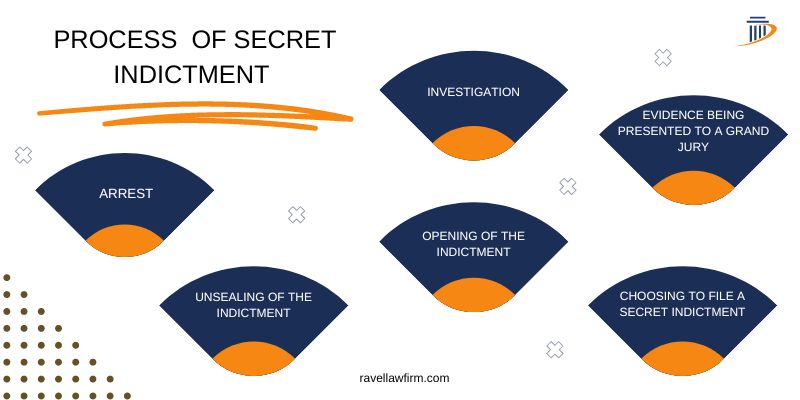A secret indictment is a legal document that accuses someone of a crime; it is not made public until the person is apprehended or a warrant is issued for their arrest. In other terms, a secret indictment is an indictment that is not made public to the defendant.
Secret indictments are typically utilized in federal criminal prosecutions in the United States because they are permitted by Rule 6(e) of the Federal Rules of Criminal Procedure. When a defendant is suspected of committing a crime, it is common practice to utilize a secret indictment to prevent them from fleeing or destroying evidence.

A grand jury, a group of citizens responsible with hearing evidence given by a prosecutor and judging if there is enough evidence to warrant an indictment, is the first step towards obtaining a secret indictment. A secret indictment will be issued by the grand jury if they determine that there is sufficient evidence.
Upon issuance, the indictment is sealed and kept secret until the defendant is apprehended or a warrant for their arrest is issued. The indictment is then made public and the defendant is made aware of the charges.
But, not every criminal case uses a secret indictment, and when it does, it must adhere to specific legal rules. For instance, the prosecutor must demonstrate that there is a compelling need for secrecy and that releasing the indictment would likely harm a person or the public interest in order to secure a secret indictment. Additionally, if the indictment was obtained against their rights, the defendant has the right to contest its legitimacy and ask that it be dismissed.
Also Read: How To Find Out If You Have a Warrant
Process of Secret Indictment
The secret indictment process is utilized when the government feels that informing the defendant of the charges might compromise the investigation or cause evidence to be destroyed. The general procedure for a secret indictment is as follows:

1. Investigation
A law enforcement organisation looks into a crime and accumulates information.
2. Evidence Being Presented To a Grand Jury
A grand jury, a panel of ordinary people who decide if there is sufficient evidence to indict the defendant, hears the prosecutor’s case and considers the evidence.
3. Choosing To File a Secret Indictment
A secret indictment may be issued by the grand jury if they find that there is enough evidence to support it.
4. Opening of the Indictment
When the defendant is detained and brought before a judge, the indictment is released. After then, the suspect is formally accused of the crime, and the court case starts. It is kept secret and not made public because the secret indictment is sealed
5. Arrest
Law enforcement officers may detain the defendant without informing them of the charges once the secret indictment has been released.
6. Unsealing of the Indictment
After the defendant is taken into custody and brought before a judge, the indictment is released. After then, the suspect is formally accused of the crime, and the court case starts.
How Do You Know If You Have a Secret Indictment?
A secret indictment is typically utilised when law enforcement officials fear that making the charges public could endanger an ongoing investigation or put people in danger.
The best approach to learn if you are under investigation or have a secret indictment against you is to speak with a defense attorney. If there is any information that suggests you may have been accused of a crime, an experienced attorney can analyse your case and make that determination.
It’s important to keep in mind that if you are the subject of a secret indictment, you could not learn about it until after your arrest. In rare situations, police enforcement may try to locate you and arrest you without any previous notice.
If you’re curious about the process of a secret indictment, you may also be interested in knowing about whether charges can be dropped after indictment.
FAQ’s
Why would an indictment be secret?
If a suspect knows that grand jury hearings are taking place, the suspect may take action to obstruct the hearings, such as threatening witnesses or grand jury members. The prosecutor makes sure that everyone will be protected during the proceedings by sealing the indictment.
How long does a Secret Indictment take?
Many variables, including as the intricacy of the case, the number of people under investigation, and the availability of evidence, might affect how long it takes to secure a secret indictment. Generally speaking, the procedure for securing a secret indictment can take a few weeks to several months.
When are Secret Indictments used?
Secret indictments are frequently utilized in cases when there is a chance that the defendant would try to leave or obliterate evidence if they learn about the allegations against them. They can also be used to conceal the identities of witnesses and shield them from threats and extortion.

Hi, I’m Brian Gary; I have my Doctor of Juridical Science (SJD) degree from SMU Dedman School of Law in Dallas. Over the years, I have dealt with many families and successful corporate Legal cases. I have counseled many people on legal matters, and along with my profession, I write about Law on my blog. Please feel free to contact me for counseling/case discussion; I’ll be happy to help you.